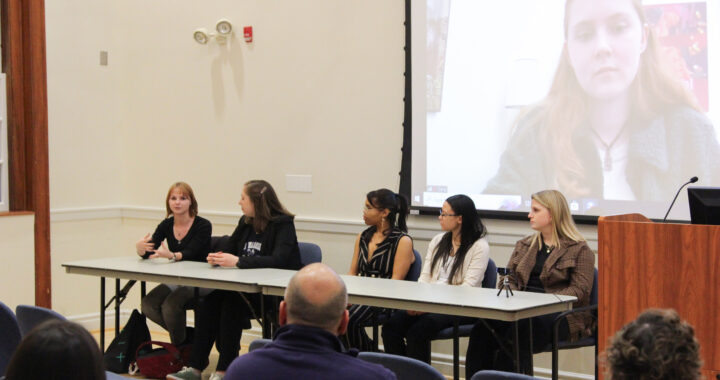Protest Keeps the Peace
3 min readBy ERIC STEIGLEDER
A group of protesters from the American Life League convened outside of George Washington Hall March 21 in response to the scheduled Great Lives lecture on the life of Margaret Sanger, an early birth control advocate.
In her lifetime, Sanger was no stranger to controversy. She was an outspoken supporter of women’s rights who fought for the decriminalization of birth-control and the development of Planned Parenthood. Yet it was with her racial views, not her views on birth control, that the protesters took issue.
According to protester Eric Whittington, executive director of the ALL’s Youth Outreach Program, Sanger was a white elitist and eugenicist who held grudges against immigrant races and minorities. Eugenics is the manipulation of hereditary traits by controlling who is allowed to reproduce.
Whittington went on to say that Sanger worked alongside known Nazi Party members.
“She got her eugenics ideas from them,” he said.
It was a partnership that ended, according to Whittington, only when the Nazis drew international criticism.
Katie Mahoney, another protester, expressed similar views.
“Sanger believed like Hitler did,” Mahoney said.
The Great Lives lecture was delivered by Ellen Chesler, author of the Sanger biography “Woman of Valor: Margaret Sanger and the Birth Control Movement in America.”
Chesler made it a point in her lecture to defend Sanger’s legacy on several occasions.
According to Chesler, during Sanger’s time, eugenics was far from being considered a pseudoscience.
“Eugenics enjoyed a degree of acceptability,” she said. While she admitted that Sanger supported negative eugenics, including the sterilization of the mentally impaired, Chesler also said that the eugenics that Sanger supported was far removed from the Social Darwinist belief in biologically based racial inferiority.
Chesler also defended Sanger’s record regarding race.
“She spoke against immigration laws and against racial stereotypes,” Chesler said. “She founded an integrated clinic in Harlem in the 1930s.”
Moreover, Sanger held the support of prominent black leaders, including W.E.B. DuBois and Martin Luther King Jr., who openly accepted the first ever Margaret Sanger Award in 1966.
Chesler was adamant that the racist quotes attributed to Sanger by the protesters were merely an attempt to discredit Sanger’s reputation.
“The quotes are either inaccurate or taken out of context,” she said.
However, Chesler said that those protesting were well in their right.
She went on to say that, like Sanger, the protesters were disseminating their beliefs through personal initiative and protest.
Krystyn Moon, Associate Professor of History, offered her own opinion of the protesters motives.
“They [the protesters], are throwing up a smokescreen. They’re trying to get people to question Margaret Sanger’s contributions by talking about other aspects that make her a contemporary of her time,” Moon said. “This should not be that surprising. People are trying to use these facts to deny women the right to control their reproduction, and that’s the bigger issue.”
Senior Julie Canstanien agreed that the protesters were not completely honest.
“The protesters had an agenda,” she said. “I thought there was something else there. They clearly had a pro-life agenda, but at least they were reasonable.”
Senior Andrea Meyer found the protests ironic, considering Sanger’s own history of protesting.
“Sanger would have handled [the protesters] well,” Meyer said. “However, she would not have been pleased with the message.”
Their demonstration included no offensive pictorials or harassment of students.
Police Chief Snipes, when asked to compare the protest that night to the pro-life exhibitions previously held on campus, asserted that the graphic nature of previous protests was not an issue.
“This group had a more low key approach,” he said. “They were not forcibly approaching people.”











